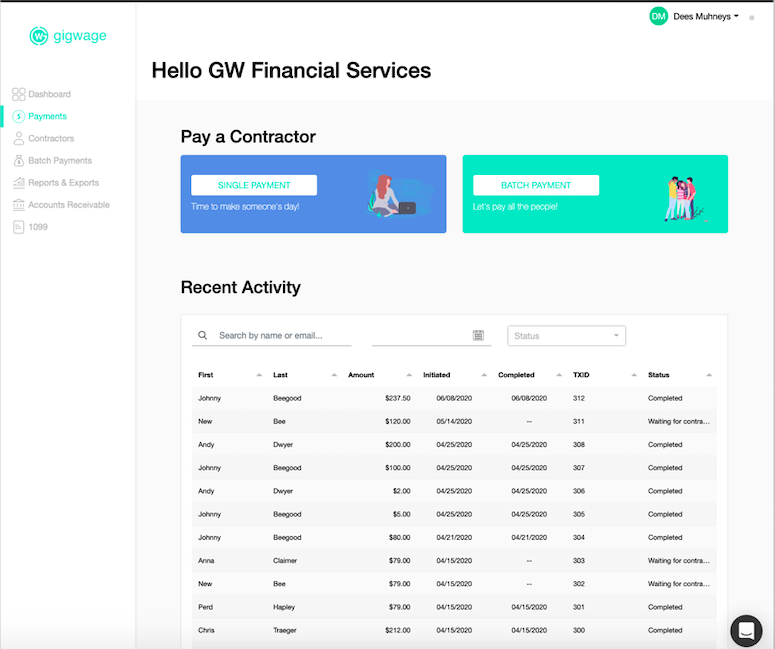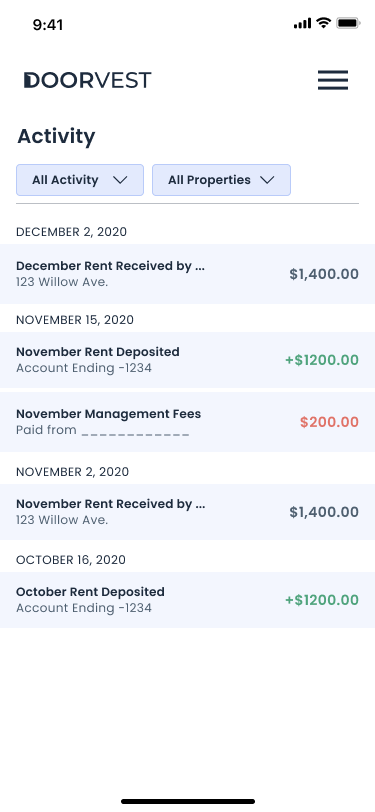Kevin Travers was a Reporter at deBanked.
Articles by Kevin Travers
Why The PPP and EIDL Data Got Dumped
December 3, 2020 The SBA’s time has run out: on Tuesday night, the organization released the loan data for all Paycheck Protection Program (PPP) recipients. The name, address, and how much each recipient received was posted in a series of excel spreadsheets in compliance with a D.C. District Court order, decided November 24.
The SBA’s time has run out: on Tuesday night, the organization released the loan data for all Paycheck Protection Program (PPP) recipients. The name, address, and how much each recipient received was posted in a series of excel spreadsheets in compliance with a D.C. District Court order, decided November 24.
The results do not inspire confidence. Despite knowing this data would be scrutinized by the public, records show that nearly $10 million went to businesses for which the business name field was not entered correctly. Some of these were blank while others contained phone numbers or random dates.
Is it fraud? Maybe, maybe not. It certainly suggests, however, that the official books on $525 billion in individual PPP loans aren’t exactly up to snuff.
The legal struggle to release the data began with filing a Freedom of Information Act (FOIA) in May by a coalition of news companies, including the New York Times, representatives for the Wall Street Journal, ProPublica, and 11 other newsrooms. They hoped to uncover where billions of CARES Act loans went but received privacy concern pushback from the SBA.
In June, the SBA released limited info on the top bracket of loans, from $150,000 upward. United States District Court Judge James Boasberg ruled that there was no reason not to release the information after the SBA refused to open the files up on the bottom 4 million loans at the beginning of November. The SBA pushed for a stay of the order, which was shot down by Boasberg, and finally, the SBA released the data.
As of early November, the agency had processed and approved more than 5.2 million individual PPP loans, along with an additional $192 billion in EIDL loans. PPP funds had the unique distinction of being forgivable so long as they were used for expenses like payroll.
A PPP & EIDL search tool is available on the Small Business Forum where anyone can query the released data.
Lawyers Chime in On What a Biden Administration Could Mean for Merchant Cash Advance
November 30, 2020 In the weeks following the election, the news cycle has been heavily focused on the presidential transition’s legal aspects.
In the weeks following the election, the news cycle has been heavily focused on the presidential transition’s legal aspects.
Instead of worrying about vote recounts, merchant cash advance (MCA) companies are considering what legal changes, if any, might come after Jan 20th. Will the Biden administration spell the beginning of new regulations on the world of business to business financing?
Lawyers say that while the industry is waiting on Georgia to decide the Senate’s fate, increased regulation at the federal is unlikely to occur.
“If the Republicans hold in Georgia, and we have a split legislative branch, that means gridlock, and gridlock is great for the industry,” Catherine Brennan, partner at Hudson Cook, said. “The more progressive wing of the Democratic Party would like to put merchant cash advance under the auspices of quasi-consumer [loans,] but they won’t be able to do that with the split legislative branch.”
Brennan has a wealth of experience as a commercial finance compliance and litigation lawyer and regularly contributes to the national conversation on alternative and fintech law topics. She said that even if Democrats control the Senate, moderates may still hold back progressives from making new regulatory laws.
“There’s some moderate Democrats who understand the need for this market, they understand the product, and their constituents, in particular, use the product,” Brennan said. “I don’t see anything at the federal level that should be viewed as an existential threat to the ongoing existence of the industry.”
 What Brennan does see as more likely, is the gradual adoption of MCA under preexisting executive agencies like the CFPB and FTC. She pointed to the Dodd-Frank Act implementing consumer lending data collection as a possible avenue regulators might take by pushing for data collection in the MCA space.
What Brennan does see as more likely, is the gradual adoption of MCA under preexisting executive agencies like the CFPB and FTC. She pointed to the Dodd-Frank Act implementing consumer lending data collection as a possible avenue regulators might take by pushing for data collection in the MCA space.
Still, Brennan insists that MCA firms will be OK so long as they understand the FTC can already look into commercial finance practices and that it has gone after ISOs in the past. She sees that as the number one development from a regulatory standpoint because the FTC will ultimately review what took place in the financial service markets during the pandemic and decide if action is warranted. Still, if funders have been responsible and fair, they should be in a good place.
Brennan did say that the position might be up for grabs when it comes to the head of the CFPB. The previous leader, Richard Cordray, fought with the Trump administration against his re-appointment, believing his position surpassed the president’s authority to fill. Of course, it did not, and Cordray was removed, but there is nothing stopping the Democrats from re-appointing him, Brennan said, especially when other appointees may give up valuable Congressional seats.
James Huber, a partner at Global Legal Law Firm specializing in collections, believes that even if the Senate is somehow blue and passes regulation, that MCAs that are playing by the rules would benefit. The MCA business was born under the Obama administration during the last financial crisis, and if Biden beefs up the CFPB, it would only hurt payday lenders, Huber said.
“It certainly flourished under Obama, so one might think now that it’s got its foothold and it’s here you can almost guarantee that it’s going to continue to do really, really well when there’s stricter regulation,” Huber said. “Your typical deBanked cash advance technology company: I think they’re going to do well with their bread and butter product…”
Huber said that especially when we’re seeing businesses hurting for cash right now, b2b finance will thrive. Huber was worried about Biden’s talk about bankruptcy reform, however.
“Biden’s talked about bankruptcy reform, to make it easier for people to go through bankruptcy, and yield assets like their houses and their cars and things that,” Huber said. “That’s a concern; that would mean that you’re fraudulently applying for a loan, and that’ll be accepted. It slows down collection efforts; our main role in the MCA business is on [defaults].”
Katherine Fisher, a Hudson Cook partner who, alongside Brennan, has deep experience in MCA representation and compliance, agreed with her colleague that funders need to make sure they keep an eye open toward compliance when it comes to regulation.
“Firms that have not focused on the regulatory process need to start, and companies that have looked at it need to revisit it,” Fisher said. Funders should “expect to be comfortable if they are asked to describe how they comply and prepare to do so.”
 But beyond that, she sees no doomsday event on the horizon; even if the Senate is no longer Republican-controlled, it would be up to the FTC and CFPB to set the tone. If the CFPB, for example, pushed for data collection under 1071 of the Dodd-Frank Act, it might signal a more attentive regulatory environment for MCA and factoring.
But beyond that, she sees no doomsday event on the horizon; even if the Senate is no longer Republican-controlled, it would be up to the FTC and CFPB to set the tone. If the CFPB, for example, pushed for data collection under 1071 of the Dodd-Frank Act, it might signal a more attentive regulatory environment for MCA and factoring.
Compared to 2008, when the last Democratic administration took office, MCA wasn’t on the radar, Fisher said. Now that it is on the map this time around, especially after MCA funders proved how vital they were to the SMB market during the pandemic, there will be more attention on B2B transactions.
But firms only need to think of this as a chance to make sure their practices are healthy, and most of the industry has already shown signs of doing so. Fisher pointed to the FTC’s small business finance forum last year, which included a panel of MCA representatives at the table.
“I don’t think it is a scary time. It’s an opportunity for MCA to improve their processes, make sure they are following the law,” Fisher said. “They don’t need to be afraid but need to batten down. Much of the industry has already done that, the MCA industry has been focused on adopting good practices.”
From Sales to Founder: Craig J. Lewis Talks Gig Wage’s $7.5 Million Funding Round
November 27, 2020 Coming to you from the heart of Dallas, Texas is a digital payroll startup, Gig Wage, that received a $7.5 million Series A funding round just last month. The founder, CEO, and writer of The Sport of Sales, Craig J. Lewis, talked about his goal to make it easier for 1099 gig workers to get paid.
Coming to you from the heart of Dallas, Texas is a digital payroll startup, Gig Wage, that received a $7.5 million Series A funding round just last month. The founder, CEO, and writer of The Sport of Sales, Craig J. Lewis, talked about his goal to make it easier for 1099 gig workers to get paid.
Lewis made $10 million in payroll tech sales before going on to lead a firm that has seen 30% month-to-month growth this year, during a pandemic no less.
“We help businesses pay independent contractors, but because we’re so tech-centric, it’s evolved beyond just payroll,” Lewis said. “What we ended up building was financial infrastructure for the modern workforce. We help businesses get money from their customers to their contractors as fast and as flexibly as possible.”
The way Gig Wage does this, Lewis said, is by offering an online platform for the hybridization of payroll, payments, and banking from a single login. Businesses can manage their payroll needs for 1099 workers, then shift to payment needs quickly, through direct to debit, all major cards, bank transfers, and accounts receivables.
“One of the only- the only platform in the world actually that has embedded banking into payroll and payments, which is what kind of allows for this speed and flexibility that we offer,” Lewis said. “We’re like B to B to C: We help the businesses with technology and operational excellence, and because independent contractors are separate from the workplace, we provide tools for them.”
Lewis has years of experience in the payroll space- starting as a salesman for ADP small business payroll products back in 2008. Realizing he had a passion for payroll tech and getting customers the best services possible, Lewis went on to learn anything he could about the industry. Selling $10 million in software while moving across the country, Lewis landed in Silicon Valley, where he studied what it took to start a company.
“I was just awed how they thought about technology and products and company building,” Lewis said. “And I vowed to bring that to the payroll industry.”
Lews joined a startup, learned the Silicon Valley way of creating a company through an African American tech acceleration program. In 2014, Lewis founded Gig Wage to do something disruptive in the payroll space.
 As Gig Wage attests, disruption is what the 1099 gig industry needs at the very least. Lewis believed the gig economy was going to keep growing when Gig Wage started. As he watched, the gig economy ballooned into a $2 trillion industry with an estimated 65-75 million person workforce. These workers suffer from an outdated payroll system, losing an estimated 2-20% of their income to flaws in the payments system Gig Wage found.
As Gig Wage attests, disruption is what the 1099 gig industry needs at the very least. Lewis believed the gig economy was going to keep growing when Gig Wage started. As he watched, the gig economy ballooned into a $2 trillion industry with an estimated 65-75 million person workforce. These workers suffer from an outdated payroll system, losing an estimated 2-20% of their income to flaws in the payments system Gig Wage found.
“With the maturation of Uber, Lyft, Postmates, Doordash, Grubhub, Upwork, all of these kinds of gig economy freelancer companies, we had great growth going into 2020,” Lewis said. “In Q1, we were set up to raise our series A, and then March happened, and the terms got pulled off the table.”
 But when the dust settled after those first shutdown weeks, Gig Wage looked at the damage and found the skyrocketing unemployment rates and furloughs had only accelerated their growth as a company.
But when the dust settled after those first shutdown weeks, Gig Wage looked at the damage and found the skyrocketing unemployment rates and furloughs had only accelerated their growth as a company.
“The gig economy was right there waiting on the workforce to provide opportunities to earn, and we were positioned perfectly to help people compete for that talent and pay people in a modern way,” Lewis said. “The pandemic has been a huge growth accelerant for us, and we think those tailwinds will only continue.”
Those winds of success came during a time of protest. Amplified in the pandemic’s backdrop, the country was waking up to the unequal disenfranchisement black people faced. Only 1% of black founder entrepreneurs ever receive VC funding, and Lewis said he is proud to have raised a significant round, given that unfair stat.
“With so much controversy and negative energy around black people in general,” Lewis said. “I think putting this positive story out there and showing this black excellence, black tech, I think it’s super important, and it’s been something that I’ve embraced. We’ve been able to be a part of putting something extremely powerful and positive into the market.”
America is finally waking up to realize something Lewis said was obvious, that black people matter, even though it can be controversial to say so. He hopes his success can help others but affirms the funding round was no charity drive.
“This is a great opportunity for us to be clear about the fact that like hey, we’ve been working on this, we’ve built a good business and a good technology,” Lewis said. “This is a big business opportunity for our investors and us. It wasn’t charity, right: This isn’t like, oh he’s black, give him some money.”
The successful funding round shows confidence in the Gig Wage platform from Green Dot, which will allow Gig Wage to offer bank accounts and debit services to independent contractors. Green Dot is one of the only fintechs with a national banking license, Lewis said, and Gig Wage is joining the Banking-as-a-Service direction that the fintech industry is headed.
Beyond payroll, Lewis can’t wait to offer other financial products to businesses as the company grows.
“When you think about the gig economy, it’s important that people get paid fast and flexibly: You’ve got to have the cash to be able to do that,” Lewis said. “We see some unique opportunities to get involved in the lending space down the line as well as we continue to build out our technologies.”
Smarter Loans Co-Founder: Study shows Fintech in Canada Seeing Accelerated Growth
November 24, 2020 There has been fast-growing demand for digital finance products this year, according to the Smarter Loans Annual State of Canadian Fintech study. The report surveyed more than 2,500 users of the Smarter Loans site.
There has been fast-growing demand for digital finance products this year, according to the Smarter Loans Annual State of Canadian Fintech study. The report surveyed more than 2,500 users of the Smarter Loans site.
The findings show an accelerated shift to digital transactions, which Smarter loans co-founder Vlad Sherbatov attributed to a pandemic-acceleration of the tech-leaning trends that were already coming.
“One of the central insights from this year’s study is the overall increase of fintech adoption and lending,” Sherbatov said. “We’ve also noticed the fact that people are just much more likely to manage their finances online today than they were at this time 12 months ago or a year ago.”
Intending to gain insight into Canada’s fintech industry, Smarter Loans began sending questionnaires to their users starting in 2018.
“We survey some of the people that flow through our website that have used a fintech lending product in the past 12 months, we ask them questions about their experience,” Sherbatov said. “The purpose is to extract insights so that we can help push the industry forward and improve it.”
Even just two years ago the industry was a much smaller space but has ballooned since, and the Smarter Loans survey has become a one-of-a-kind focus on Canadian fintech markets. Featured with this year’s results is commentary from Canadian industry leaders like the Canadian Lenders Association, and deBanked’s own Sean Murray.
“It’s become a bit of a staple in the lending industry,” Sherbatov said. “Because it’s the only piece of research in Canada that is laser-focused on fintech lending.”
With three years of data to compare, Sherbatov said he could see a significant increase in online activity. Part of this is just due to where the world is heading, as Sherbatov described the younger generations just stepping into the financial world.
“This is something that’s been happening for years; this is a trend that has started a long, long time ago,” Sherbatov said. “For younger generations, the way that they approach financial products and companies is very different from someone in my generation or older. Online is the standard of doing business, on-the-go, and mobile is the standard of managing your financial affairs.”
Fintech in Canada, Sherbatov said, tends to lag behind the growth of the fintech industry in other countries but is on the rise due to the Coronavirus. The digital adoption trend was pushed forward, as some customers that had been reluctant to bank online were forced to do so by necessity. Now, these changes to the way business is transacted are here to stay, Sherbatov said.
Like the surge in eCommerce activity, people are going online to make financial transactions.
“You go to Amazon to buy laundry detergent, and you go online to open up a checking account to pay some bills,” Sherbatov said. “Everybody needs financial services, just like everybody else needs household items; it’s how we’re going about obtaining them. This has changed and has accelerated due to Covid.”
How Start-Up Founder Andrew Luong Went From House Flipper to Real Estate CEO
November 19, 2020 Andrew Luong said it all started seven years ago in San Francisco, just out of graduate school investing in real estate with his spare time on the weekends. Today, his startup Doorvest manages more than $20 million in real estate assets.
Andrew Luong said it all started seven years ago in San Francisco, just out of graduate school investing in real estate with his spare time on the weekends. Today, his startup Doorvest manages more than $20 million in real estate assets.
“I wanted to look for an avenue to put the money that I had earned from my day job to work,” Luong said. “The goal was to seek out some income security, build a long-term nest egg, hopefully, some passive income to support my life.”
That avenue turned out to be real estate. Luong thinks more people should have the option to invest in the estimated $3 trillion single-family renting market, now more than ever.
A second wave of infections is sweeping across the nation, and with shutdowns looming and business growth on hold, many face a familiar question:
What can I do to make more money?
Luong believes Doorvest has an answer. The firm offers what Luong calls a Democratized way to invest in real estate, entirely online.
Customers can invest up to $100,000 on the platform. Luong and his team of real estate flipping specialists buy, refurbish, and then rent properties, paying back the rent revenue to investors. Luong said Doorvest only gets paid when the properties are profitable, and the reported average annual return on investment is 18%.
The idea came about when Luong and co-founder Justin Kasad tried to find a better way to invest.
Like his peers back in San Francisco, Luong had tried his hand trading stocks. Many of his friends had Robinhood or high yield savings accounts, and were even trading cryptocurrency- but none of those options were what they were looking for. Real estate felt like that next step, but there was a large process to go from cash investment to payday:
 “From identifying a mortgage to underwriting, looking through offers, ultimately an offer that sticks, then you’re figuring out how to find a mortgage financing, how to get homeowner insurance,” Luong said. “Then you’re closing on this thing, take the title, and you’re figuring out how to lease it out, how to manage your residents, and then ultimately, maintenance and bookkeeping.”
“From identifying a mortgage to underwriting, looking through offers, ultimately an offer that sticks, then you’re figuring out how to find a mortgage financing, how to get homeowner insurance,” Luong said. “Then you’re closing on this thing, take the title, and you’re figuring out how to lease it out, how to manage your residents, and then ultimately, maintenance and bookkeeping.”
With a long, dizzying list of steps, all with uncertain outcomes, it is no wonder a lot of people are put off by that risk, Luong said.
“When my good friend and co-founder Justin and I went through that long list of items, it dawned upon us that if we could deconstruct real estate investing and rebuild it in an online frictionless way, we could bring it to the masses,” Luong said. “We see real estate as a vehicle to funnel people toward financial security.”
The pair got a group of experienced real estate investors and partnered with mortgage providers and renovators to build a platform to handle all of the steps it takes to turn cash into rent income returns. Doorvest will run every step of the process, including property management, while updating investors at every step of the way.
The firm currently focuses on the Houston rental market, Luong’s long term bread-and-butter area, but plans on renting in other markets in the future.
The platform has been in the works for years, but finally launched last year and immediately had to deal with the pandemic, but Luong said Doorvest made it through so far with success.
“It was definitely an experience, back in mid-march Justin and I were like crap, I think we’re done,” Luong said. “Public equities markets were tanking; we’re a young company without a lot of cash. I think people saw the volatility of the public equities market. In that span of two weeks it went down 40% or so and I think that led a retreat towards perceived reliable asset classes.”
To some, investing in Doorvest was perceived as more reliable than a tanking stock market, and after initial fluctuation, the firm is on the up. In his experience, Luong said the real estate market would continue to push toward suburban areas outside of major city centers as the pandemic continues.
All the while, everything is moving digital. As the company evolves, Luong is excited to offer new products to customers, using real estate as a vehicle to build a banking platform or mortgage platform to service a growing smorgasbord of online real estate options.
“We as a company made a bet three to five years out: we believe that real estate will be transacted entirely online,” Luong said. “Historically, you’d show up at a house, walk around, etc. Due to COVID, people weren’t going out, weren’t shaking hands: The adoption of technology to look at a home entirely online just became a lot more natural. Because of that, we’ve had really strong customer demand and fundraising.”
What Would a Biden White House Mean for The MCA Industry?
November 14, 2020 What do small business finance companies think about the reality of a Biden White House? Will there be dramatic regulatory changes, massive new government stimulus, or significant differences in coronavirus policy?
What do small business finance companies think about the reality of a Biden White House? Will there be dramatic regulatory changes, massive new government stimulus, or significant differences in coronavirus policy?
“Not likely,” according to the head of two funders we spoke with. The CEOs of Greenwich Capital Management and Spartan Capital Group seemed to agree that overall, not much would change.
“We don’t expect any major changes to the industry to MCA,” Frank Ebanks, Spartan Capital owner, said. “I don’t think it would be any different than what we saw and experienced under Trump. Some states, some federal organizations attempted to regulate the industry, that’s already on the way, and that might continue: I don’t see it picking up any intensity.”
Ebanks’ firm has been around for four years, funding deals of up to $2 million. In that time, Ebanks has seen states like New York and California pass lending regulation and renewed activity at the CFPB, but never a fed-wide push to take on small business lending.
Nathan Abadi of Greenwich Capital Management, believes there might be short term benefits under Biden.
“In the short term, I think it’s going to be pretty good for people in our industry because under a Biden administration, we’ll see more bailouts go to SMBs than we would in a republican administration,” Abadi said. “If small businesses get bailed out, that means they can make their payments, and everyone is winning.”
He was less optimistic in the area of regulation, however.
“It’s necessary for our industry to have some vetting process and some regulation, as you saw happen with Par recently,” Abadi said. “All these other companies are taking in private investments from multiple investors, not necessarily accredited, and the money kind of goes into a black hole.”
Abadi further said that he thought while regulation is good for those who play by the rules, Democrats can go overboard.
Ebanks, meanwhile, thinks there is saftety in being a B2B business.
“Transactions between two individual companies are hard to regulate, especially when it comes to contracts,” Ebanks said. “That will stand and be around for a long time regardless of the government or who the president is.”
Ebanks continued to point out that an incoming administration would avoid changing anything that might hurt the economy now more than ever.
“I think that the President-Elect will put teams together that will attack the coronavirus situation aggressively and will neutralize it rather than try to live with it,” Ebanks said. “It’ll be tough for a month or two. And after that, it will be sort of back to normal, with just heavy aggressive localized actions.”
Fed Lowers Minimum Main Street Lending Program Loan to $100,000: Too Little, Too Late?
November 8, 2020 “$100,000, we can make that work,” said Ryan Metcalf, head of Public Policy Affairs at Funding Circle. “But we can help a lot more small business if it was $50,000.”
“$100,000, we can make that work,” said Ryan Metcalf, head of Public Policy Affairs at Funding Circle. “But we can help a lot more small business if it was $50,000.”
Metcalf was referring to a recent change in the minimum loan amount in the Main Street Lending Program (MSLP.) Just recently, the Federal Reserve lowered the minimum loan amount for the MSLP for a third time, to $100,000. The change was intended to broaden the underused Cares Act aid facility but it might not be enough.
Though changing the program days before, at a press briefing Thursday Fed chair Jerome Powell said SMB aid projects like PPP and the MSLP were up to the gridlocked House and Senate.
“The Fed cannot grant money to particular beneficiaries; we can only create programs or facilities to make loans that will be repaid,” Powell said. “Elected officials have the power to tax and spend, and to make decisions about where we as the society should direct our collective resources.”
Despite Powell’s talk of inaction in the face of an undecided congress, Metcalf said the Fed’s actions have proved that changes can be made to existing programs. Metcalf has been fighting for changes to MSLP for months on behalf of the small business lending community, he says.
In July, Metcalf, in partnership with the Innovative Lending Platform Association and Marketplace Lending Association, wrote a letter to the fed to argue for changes to the MSLP.
The letter argued that the Cares Act made non-depository finech lenders eligible to participate in PPP lending. Though these lenders saved millions of jobs, they were not allowed to lend through the MSLP facility.
Even if they could, the minimum loan size was still too large for “main street” American businesses that needed capital. The letter advocated for a lower minimum of $50,000, allow lenders that were approved for PPP to lend in the MSLP, and create a Special Purpose Vehicle for fintechs.
Metcalf said the Fed has only responded, “that is not under consideration.”
So far, 400 borrowers have taken out $3.7 billion in loans, of the $600 billion allocated. The program offers Fed backed five-year loans with differed principal and interest payments and minimal rates. With the facility’s deadline approaching Dec 31 and no changes in sight, Metcalf said the program’s vultures are circling.
If new aid, revisions, or at least an extension is not passed by when the government is funded Dec 11, Metcalf said the program might be finished.
Back in September, Powell testified before Congress that lowering the minimum any further wouldn’t change the adoption rate.
“We have very little demand below a million, as I told the chair a while back,” Powell said. “We’re not seeing demand for very small loans. And that’s really because the nature of the facility and the things you’ve got to do to qualify, it tends to be larger sized businesses.”
Mnuchin has consistently argued that grant programs like PPP would most benefit smaller firms. Metcalf said this was only the case because the MSLP facility has left out smaller firms and alternative lenders that need the capital.
“My response to that was no, there’s been no uptick in your program because the requirements of the program are not attractive enough to make it workable,” Metcalf said. “Don’t scrap the entire program altogether; look at the proposal that we sent you back in July and work with us on amending the facility.”
New Jersey Legalizes Recreational Marijuana
November 4, 2020One chill result from the 2020 election was the legalization of recreational marijuana in New Jersey for adult use. In a 2-1 victory, Option One on New Jersey ballots passed, paving the way for a regulated environment for recreational use, possession, and cultivation in the Garden State.
4:20 PM.
Time to legalize it. pic.twitter.com/157WC7qgof
— Governor Phil Murphy (@GovMurphy) October 28, 2020
Before the vote, Gov. Murphy showed support
We did it, New Jersey!
Public Question #1 to legalize adult-use marijuana passed overwhelmingly tonight, a huge step forward for racial and social justice and our economy. Thank you to @NJCAN2020 and all the advocates for standing on the right side of history.
— Phil Murphy (@PhilMurphyNJ) November 4, 2020
The amendment was billed as not only a chance to increase tax revenue but as civil rights reform. Advocates argued that prohibition laws disproportionately harmed minority communities.
The change was initially put before the legislature in 2017 but failed to pass by 2019. A bipartisan supermajority put the choice up to the public referendum. Appearing in Willingboro on Tuesday, long time advocate of legalization, Gov. Phil Murphy, spoke on voting day in last-minute support.
“I got to supporting it first and foremost due to social justice,” Murphy said. “We inherited when I became governor the largest white, nonwhite gap of persons incarcerated in America, and the biggest contributor to that was low-end drug offenses.”
New Jersey was one of four states with legalization on the ballot, and all succeeded, bringing adult use to Arizona, Montana, and South Dakota as well. After Tuesday, more than 111 million Americans- a third of the country live in a state where recreational marijuana is legal.

Image SourceKEY
Blue = Legal
Dark Green = Legal for medical use
Light Green = Legal for medical use – limited THC content
Grey = Prohibited for any use
D = Decriminalized
Cannabis legalization advocates, like Doctors For Cannabis Regulation (DFCR), saw the day as a significant victory for industry and social progress. Dr. David Nathan founded DFCR in 2015, where he serves as president of the board. Dr. Nathan stood up and spoke out against the prohibition of marijuana 11 years ago and said he was one of the first accredited mainstream physicians to do so.
“I’m not a medical cannabis physician, I’m a psychiatrist who sees how much damage cannabis prohibition does compared to the drug itself,” Dr. Nathan said. “I’ve really been given the platform to speak up, but at the same time, it was hard to get colleagues to speak up on an issue.”
After working for NJ United for Marijuana Reform, Dr. Nathan founded DFCR to create an organization to facilitate physicians who wanted to get involved at a national level. The success of Tuesday’s vote demonstrates how far legal cannabis advocation has come, from a resounding no to a majority yes.
“A lot of doctors who understood cannabis prohibition as a tragedy and a mistake were concerned about what their peers would think about them if they spoke out,” Dr. Nathan said. “Now we’ve got a group of highly respected physicians organized and advocating strongly, not just for legalization but much more importantly for effective regulation.”
Dr. Nathan sees the NJ amendment as a significant chance for improvement in public health. Despite legalization, it is unclear how the new law will go into effect. Per the amendment, the state will create a regulatory framework and tax the sale of marijuana at 6.625%, but implementation is up for debate.
Legislators still have to agree on how a new Cannabis Regulatory Commission will function. The state will also have to choose how decriminalization, possession limits, growing limits work, and forgiveness of past marijuana crimes.
All of which will be figured out and are necessary to the fair implementation of the passage of the amendment, Dr. Nathan said.
But those changes may come fast. NJ, like many states, is hurting during the COVID recession. Last month New Jersey officials approved a budget that is set to borrow $4.5 billion from the Federal Reserve to plug pandemic-sized holes in state spending.
Basing estimates on Colorado’s experience after legalizing cannabis in 2014, the state legislature predicts NJ could see tax revenues of up to $126 million a year from recreational sales.
“According to the Colorado Department of Revenue, retail cannabis sales, excluding medical cannabis, totaled $1.2 billion in calendar year 2018,” The report said. “Assuming New Jersey experiences similar per capita sales of recreational cannabis as Colorado, total retail cannabis sales for New Jersey could reach $1.9 billion, yielding sales tax revenues of up to $125.6 million annually at the current 6.625 percent sales tax rate.”
With such high revenues, some suspect New Jersey to lead the way for other northeastern states; income will spur jealous neighboring Pennsylvania and New York to legalization in competition.
“If this gives both Pennsylvania and New York a push, that would be great,” Dr. Nathan said. “I do think it’s going to have an impact, now that there will be a state right in the middle of the Mid Atlantic that is going to have regulated sales.”
But even with tristate legalization, the cannabis industry faces a problem with funding.
Most firms in cannabis supply chains- from growers to dispensaries- are small businesses that suffer from a lack of access to bank funding. Because marijuana is an illegal Section 1 drug like Heroin on a federal level, banks and venture capitalists have their hands tied when it comes to credit. But with Tuesday’s victories for legalization, federal regulation is closure to changing.
“I think that each state that adopts, sends a stronger message to the federal government,” Dr. Nathan said. “The voters in those states are giving resounding victories to the notion that cannabis should be de-scheduled not rescheduled, and then regulated.”
deBanked has been following the SAFE Banking Act since it passed in the House last year, a piece of legislation that hopes to address cannabis banking problems by allowing legal pot firms to open banking deposit accounts.
The law was bundled into the HEROES act with the rest of business aid projects, stuck between the GOP-controlled Senate and the blue House since the summer. Depending on the Senate’s layout when ballots are fully counted, financial institutions that have left pot companies de-banked may be-danked.






























